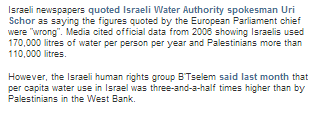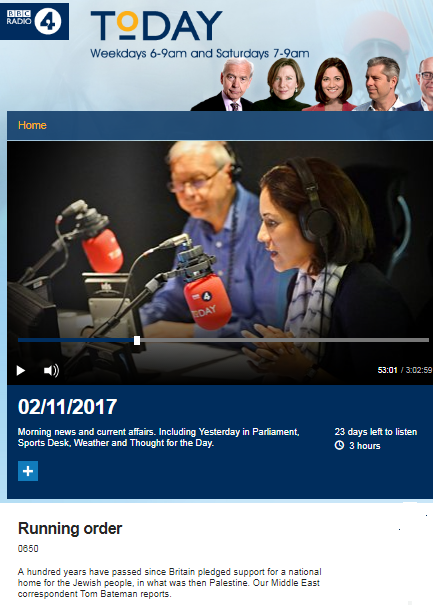As was noted here last week, a BBC News website article from February 12th included the following statements:
“Israeli newspapers quoted the national water authority as saying the figures quoted by the European Parliament chief were “wrong”, with Israelis receiving 170,000 litres of water per person per year and Palestinians more than 110,000 litres.
However, the Israeli human rights group B’Tselem said last month that per capita water use in Israeli towns – 242 litres – was three-and-a-half times higher than by Palestinians in the West Bank.”
Following a reader’s complaint which pointed out the BBC’s confusion of water consumption with allowances, that section of the article was amended and now reads as follows:
BBC audiences are however not informed of the amendment to the report in a footnote and of course those who had already viewed the item during the two days which passed between its publication and the amendment would be highly unlikely to revisit it just to see if any sort of correction has been made, meaning that the initial misleading impression will remain.
The BBC’s ‘Corrections & Clarifications’ webpage specifically notes that:
“This page contains the BBC’s responses to editorial, technical and corporate issues. It includes apologies, significant corrections, statements and responses, and findings from the BBC Trust.
It does not include routine corrections to news stories, minor on-air apologies and schedule changes.” [emphasis added]
In other words, the BBC – an organization supposedly committed to standards of accuracy – apparently does not deem it necessary to relieve members of its audience of any misleading impressions they may have received from its online news output.
It really would not be so difficult for the BBC News website to set up a dedicated corrections page along the lines of the one run by the NYT. As Craig Silverman wrote in the Columbia Journalism Review in 2011:
“The point of an online corrections page is to have a centralized place where readers can see the latest mistakes and corrections. It gives them the opportunity to discover if a recent article they read, or reporting they heard or saw, has been updated or corrected. It also provides a basic element of transparency. A dedicated page makes corrections more visible and accessible, and it increases the likelihood that people will receive the corrected information. After all, that’s the point of making correction in the first place.”
One would naturally expect that an organisation which “aspires to remain the standard-setter for international journalism” would be enthusiastic about taking onboard such a simple method of increasing transparency and improving its reputation for accuracy.





